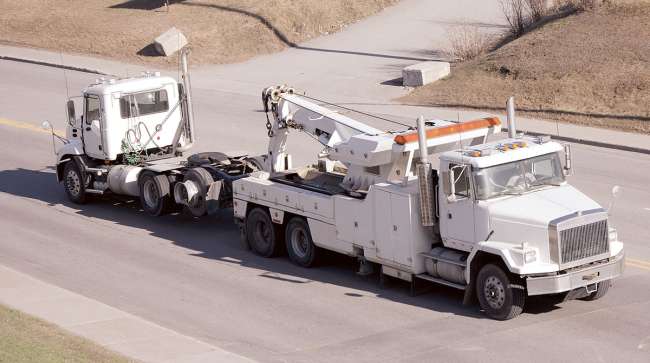Staff Reporter
Fla. Bill Tackling Predatory Towing Moves to Governor’s Desk

[Stay on top of transportation news: Get TTNews in your inbox.]
A priority for Florida truckers, a proposed law with sweeping changes to curb predatory towing practices, has moved from unanimous passage in the state Legislature to the desk of Gov. Ron DeSantis and is awaiting action.
House Bill 179, led by state Rep. Melony Bell and state Sen. Keith Perry, both Republicans, was a multiyear effort to enact meaningful reforms in the state’s towing and recovery business, Florida Trucking Association CEO Alix Miller said.
The legislation contains 17 key changes to state law that would take effect in July if enacted. One provision stipulates when towing-storage operators may claim a lien on motor vehicles or vessels for specified fees and another contains a foreclosure process for unpaid fees.
Miller called the successful legislation “a huge victory for trucking in Florida, the trucking industry nationally, who have seen invoices as high as $200,000, and the motoring public, who fall victim to predatory towing companies.”

Miller
The bill includes some significant new requirements to set and publicize rates, have detailed and itemized invoices, require towers to accept multiple payment options, and offer a dispute resolution process for consumers and carriers to challenge excessive fees.
“FTA fought for these and other priority provisions,” Miller noted.
According to a recent American Transportation Research Institute study, excessive rates are the most common type of predatory towing (experienced by 83% of motor carriers), followed by unwarranted extra service charges (82%). ATRI found that the majority of carriers “encountered additional issues, such as truck release or access delays, cargo release delays, truck seizure without cause and tows misreported as consensual.”
“The towing and recovery industry is vital to the Florida trucking industry, and we’re grateful to have many as members of FTA and for their input in the legislation,” Miller said. “H.B. 179 will weed out the predatory towing tactics of bad actors and make the entire industry better and safer.
“We applaud Rep. Bell, Sen. Perry, Florida House Transportation and Modals Subcommittee Chair Fiona McFarland and the entire Florida Legislature for their steadfast efforts in addressing this issue.”

Bracher
American Trucking Associations Deputy General Counsel Pamela Bracher described Florida’s proposed legislation as “phenomenal” and a welcome move in dealing with predatory towing practices that are caused by “a few bad apples that have spoiled the whole bunch” and harm all consumers.
“For those bad apples, they act egregiously,” Bracher said. “It impacts passenger vehicles as well as trucks. The problem is the impact is greater sometimes for the truck depending upon the predatory behavior. We’re talking about heavy-duty machinery, and often the costs are more exorbitant than for someone who owns a Toyota Camry. It’s a real problem.”
She pointed out several important elements of Florida’s proposed law. One significant aspect of the bill would require counties and municipalities to set maximum rates for nonconsensual tows and publish those rates on their websites.
“It’s a step in the right direction, for sure. Predatory towing is not a new issue. Let me be clear: We’re not talking about all tow companies,” Bracher said.
Listing all fees regarding vehicle/vessel recovery, removal and storage, rate sheets must be posted at businesses and given when requested by vehicle/vessel owners, lien holders, insurance companies or their representatives. Any fees charged that are not listed on rate sheets would be considered unreasonable. Before attaching a vehicle/vessel to a wrecker, towing operators would be required to give the rate sheet to the owner or operator if that person is present.
Meghann Erhart of Relay Payments shares ways to prevent falling prey to fuel card skimming. Tune in above or by going to RoadSigns.ttnews.com.
“They have to establish a process for investigating and resolving claims and complaints regarding excessive fees. That bill also states that maximum tow rates that have been set by the Florida Highway Patrol for nonconsenual tows would be applicable to any small municipalities that don’t set maximum rates,” Bracher said, adding that the tow company “can’t hold the cargo hostage for payment of the bill.”
The legislation also contains several timeline changes involving when liens are imposed on vehicles and vessels. It would increase the minimum number of days before an unclaimed newer-model vehicle/vessel can be sold and lengthen the time between notices and dates of public sales on vehicles/vessels.
Want more news? Listen to today's daily briefing above or go here for more info
Also, towing-storage operators would have fewer days to charge for storage if they fail to provide notice to a lender/other lien holder on a vehicle or vessel.
“A number of motor carriers have issues recovering personal property and undamaged trailers that have been towed and stored,” Miller said. “In these instances, the inspection and release of the vehicle, vessel, trailer or personal property must be permitted within one hour and during normal business hours at the site where the vehicle, trailer or vessel is stored. The operator must accept government-issued photo identification and cannot require additional forms of identification to access and/or release the vehicle.”





